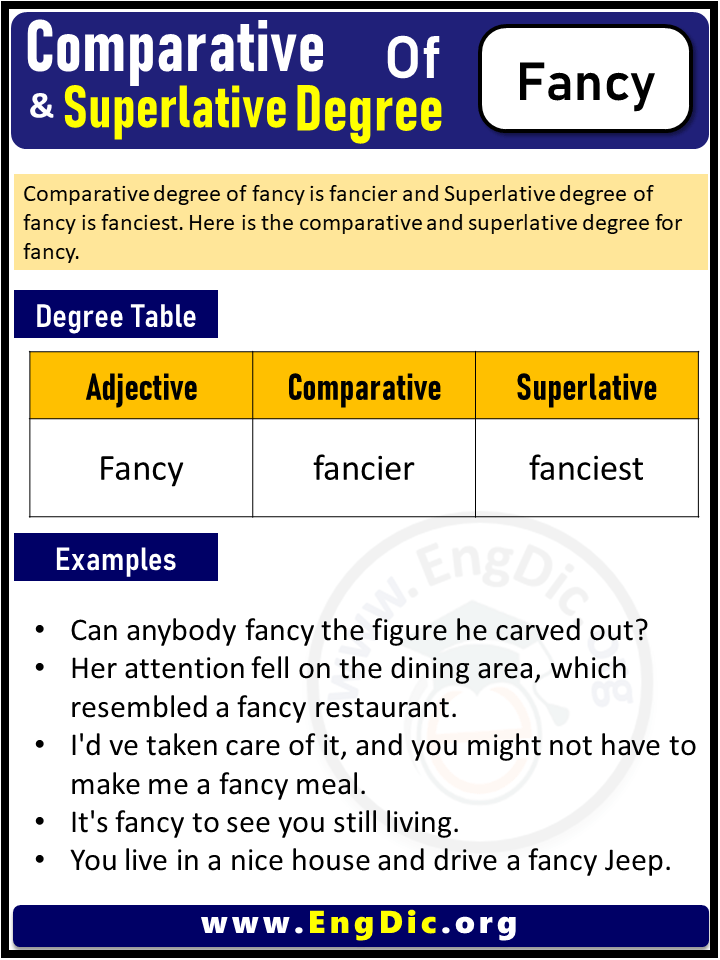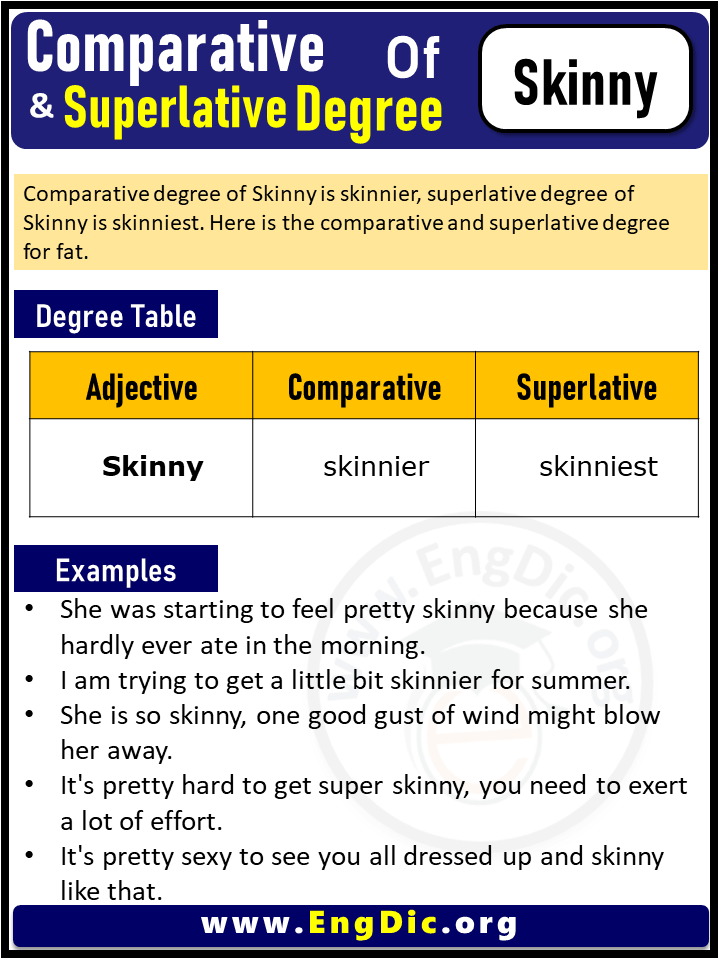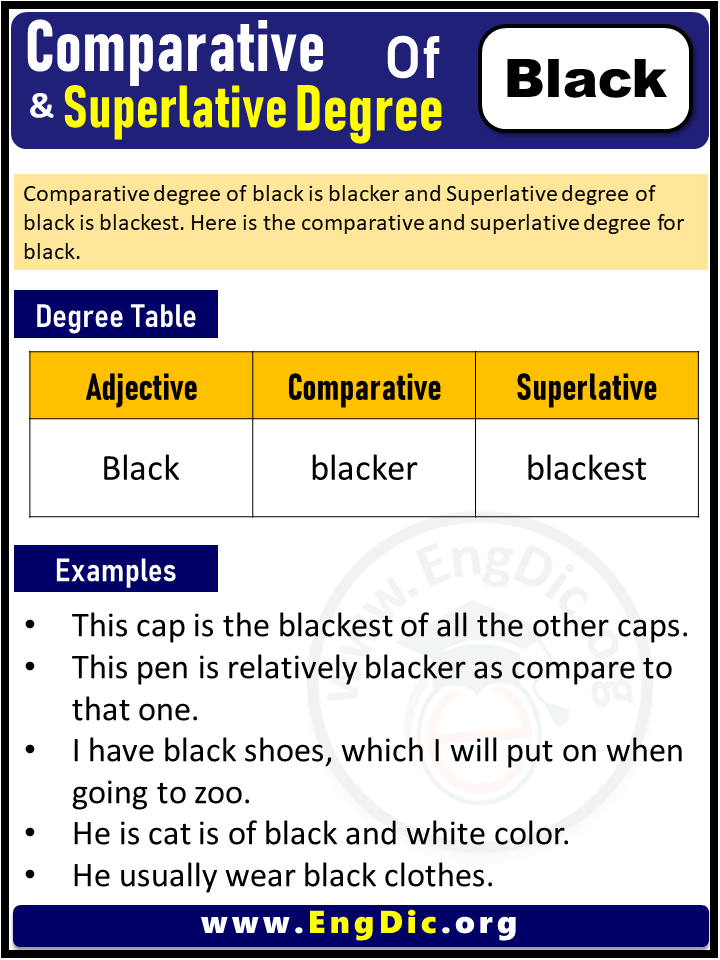Degree of Adjectives List Pdf! Welcome to our blog post on the fascinating world of degrees of adjectives! Adjectives play a crucial role in describing and comparing things, and understanding their different degrees is essential for effective communication. In this article, we’ll explore the types of degrees, and how they are formed, and provide you with a handy list of examples. Let’s dive in!
Before going towards our discussion of what exactly is the comparative and superlative adjective, let us discuss what exactly is an adjective.
What is an Adjective?
In linguistics, an adjective (abbreviated adj.) is a word that modifies a noun or noun phrase or describes its referent. Adjectives describe or modify—that is, they limit or restrict the meaning of—nouns and pronouns. Words like small, blue, and sharp are descriptive, and they are all examples of adjectives.
What is the Degree of Adjective?
In English grammar, adjectives can be classified according to their degree, which refers to the level or intensity of a quality or attribute being described.
The degree of adjectives is sometimes called the degree of comparison.
Types of Degree of Adjectives
The three degrees of adjectives are:
Positive degree: The positive degree of an adjective is the simplest form, used to describe a quality without any comparison. It is used when no comparison is made between two or more things. For example:
- “She is a talented singer.”
- “He has a big house.”
Comparative degree: The comparative degree is used when we want to compare two things or qualities. It is formed by adding “-er” to most one- or two-syllable adjectives, or by using “more” with most adjectives of three or more syllables. For example:
- “She is taller than her sister.”
- “This book is more interesting than the previous one.”
Superlative degree: The superlative degree is used when we want to compare three or more things or qualities. It is formed by adding “-est” to most one- or two-syllable adjectives, or by using “most” with most adjectives of three or more syllables. For example:
- “She is the tallest girl in the class.”
- “That is the most beautiful sunset I’ve ever seen.”
It’s important to note that some irregular adjectives have different forms in comparative and superlative degrees. For example:
- “Good” (positive), “better” (comparative), “best” (superlative)
- “Bad” (positive), “worse” (comparative), “worst” (superlative)
These degrees of adjectives allow us to express a range of comparisons and distinctions in our descriptions.
Formation of a Superlative and Comparative
1. To form a degree of a single syllable adjective we will add ‘-er’ to make comparative and for superlative we can add ‘-est’.
| Positive Degree | Comparative Degree | Superlative Degree |
| Tall | Taller | Tallest |
| High | Higher | Highest |
| Strong | Stronger | Strongest |
Note: Sometimes this rule also applies to disyllable adjectives.
| Positive Degree | Comparative Degree | Superlative Degree |
| Easy | Easier | Easiest |
| Happy | Happier | Happiest |
| Clever | Cleverer | Cleverest |
| Early | Earlier | Earliest |
2. To make a Comparative degree of Adjectives have two or more than two syllables we can add ‘more’ and most for superlative.
| Positive Degree | Comparative Degree | Superlative Degree |
| Careful | More Careful | Most Careful |
| Expensive | More Expensive | Most Expensive |
| Difficult | More Difficult | Most Difficult |
| Tired | More Tired | Most Tired |
Irregular Comparative and Superlatives
There are no specific rules to make degrees for such adjectives.
| Positive Degree | Comparative Degree | Superlative Degree |
| Bad | Worse | Worst |
| Good | Better | Best |
| Little | Less | Least |
| Many | More | Most |
| Much | More | Most |
| Far (place) | Farther | Farthest |
| Far (people or time) | Further | furthest |
| Old (people) | Elder | Eldest |
| Old (people or things) | Older | Oldest |
List of Degree of Adjectives
Below is the list of degrees of adjectives. By exploring the positive, comparative, and superlative degrees, we can effectively express the nuances of different attributes and make meaningful distinctions in our descriptions.
| Angry | Angrier | Angriest |
| Bad | Worse | Worst |
| Big | Bigger | Biggest |
| Bitter | Bitterer | Bitterest |
| Black | Blacker | Blackest |
| Bland | Blander | Blandest |
| Bloody | Bloodier | Bloodiest |
| Blue | Bluer | Bluest |
| Bold | Bolder | Boldest |
| Bossy | Bossier | Bossiest |
| Brave | Braver | Bravest |
| Brief | Briefer | Briefest |
| Bright | Brighter | Brightest |
| Broad | Broader | Broadest |
| Busy | Busier | Busiest |
| Calm | Calmer | Calmest |
| Cheap | Cheaper | Cheapest |
| Chewy | Chewier | Chewiest |
| Chubby | Chubbier | Chubbiest |
| Classy | Classier | Classiest |
| Clean | Cleaner | Cleanest |
| Clear | Clearer | Clearest |
| Clever | Cleverer | Cleverest |
| Close | Closer | Closest |
| Cloudy | Cloudier | Cloudiest |
| Clumsy | Clumsier | Clumsiest |
| Coarse | Coarser | Coarsest |
| Cold | Colder | Coldest |
| Cool | Cooler | Coolest |
| Crazy | Crazier | Craziest |
| Creamy | Creamier | Creamiest |
| Creepy | Creepier | Creepiest |
| Crispy | Crispier | Crispiest |
| Cruel | Crueler | Cruelest |
| Crunchy | Crunchier | Crunchiest |
| Curly | Curlier | Curliest |
| Curvy | Curvier | Curviest |
| Cute | Cuter | Cutest |
| Damp | Damper | Dampest |
| Dark | Darker | Darkest |
| Deadly | Deadlier | Deadliest |
| Dear | Dearer | Dearest |
| Deep | Deeper | Deepest |
| Dense | Denser | Densest |
| Difficult | More difficult | Most difficult |
| Dirty | Dirtier | Dirtiest |
| Dry | Drier | Driest |
| Dull | Duller | Dullest |
| Dumb | Dumber | Dumbest |
| Dusty | Dustier | Dustiest |
| Early | Earlier | Earliest |
| Easy | Easier | Easiest |
| Empty | Emptier | Emptiest |
| Faint | Fainter | Faintest |
| Fair | Fairer | Fairest |
| Famous | More famous | Most famous |
| Fancy | Fancier | Fanciest |
| Far | Farther/further | Farthest/furthest |
| Fast | Faster | Fastest |
| Fat | Fatter | Fattest |
| Few | Fewer | Fewest |
| Fierce | Fiercer | Fiercest |
| Filthy | Filthier | Filthiest |
| Fine | Finer | Finest |
| Firm | Firmer | Firmest |
| Fit | Fitter | Fittest |
| Flaky | Flakier | Flakiest |
| Flat | Flatter | Flattest |
| Foolish | More foolish | Most foolish |
| Fresh | Fresher | Freshest |
| Friendly | Friendlier | Friendliest |
| Full | Fuller | Fullest |
| Funny | Funnier | Funniest |
| Gentle | Gentler | Gentlest |
| Gloomy | Gloomier | Gloomiest |
| Good | Better | Best |
| Grand | Grander | Grandest |
| Grave | Graver | Gravest |
| Greasy | Greasier | Greasiest |
| Great | Greater | Greatest |
| Greedy | Greedier | Greediest |
| Green | Greener | Greenest |
| Gross | Grosser | Grossest |
| Guilty | Guiltier | Guiltiest |
| Hairy | Hairier | Hairiest |
| Handy | Handier | Handiest |
| Happy | Happier | Happiest |
| Hard | Harder | Hardest |
| Harsh | Harsher | Harshest |
| Healthy | Healthier | Healthiest |
| High | Higher | Highest |
| Hip | Hipper | Hippest |
| Humble | Humbler | Humblest |
| Hungry | Hungrier | Hungriest |
| Icy | Icier | Iciest |
| Itchy | Itchier | Itchiest |
| Juicy | Juicier | Juiciest |
| Kind | Kinder | Kindest |
| Large | Larger | Largest |
| Late | Later | Latest |
| Light | Lighter | Lightest |
| Likely | Likelier | Likeliest |
| Little | Littler | Littlest |
| Lively | Livelier | Liveliest |
| Lonely | Lonelier | Loneliest |
| Long | Longer | Longest |
| Loud | Louder | Loudest |
| Lovely | Lovelier | Loveliest |
| Low | Lower | Lowest |
| Mad | Madder | Maddest |
| Many | More | Most |
| Mean | Meaner | Meanest |
| Messy | Messier | Messiest |
| Mild | Milder | Mildest |
| Moist | Moister | Moistest |
| Narrow | Narrower | Narrowest |
| Nasty | Nastier | Nastiest |
| Naughty | Naughtier | Naughtiest |
| Near | Nearer | Nearest |
| Neat | Neater | Neatest |
| Needy | Needier | Neediest |
| New | Newer | Newest |
| Nice | Nicer | Nicest |
| Noisy | Noisier | Noisiest |
| Odd | Odder | Oddest |
| Oily | Oilier | Oiliest |
| Old | Older | Oldest |
| Plain | Plainer | Plainest |
| Polite | Politer | Politest |
| Poor | Poorer | Poorest |
| Popular | More popular | Most popular |
| Pretty | Prettier | Prettiest |
| Proud | Prouder | Proudest |
| Quick | Quicker | Quickest |
| Quiet | Quieter | Quietest |
| Rare | Rarer | Rarest |
| Raw | Rawer | Rawest |
| Renowned | More renowned | Most renowned |
| Rich | Richer | Richest |
| Ripe | Riper | Ripest |
| Risky | Riskier | Riskiest |
| Roomy | Roomier | Roomiest |
| Rough | Rougher | Roughest |
| Rude | Ruder | Rudest |
| Rusty | Rustier | Rustiest |
| Sad | Sadder | Saddest |
| Safe | Safer | Safest |
| Salty | Saltier | Saltiest |
| Sane | Saner | Sanest |
| Scary | Scarier | Scariest |
| Shallow | Shallower | Shallowest |
| Sharp | Sharper | Sharpest |
| Shiny | Shinier | Shiniest |
| Short | Shorter | Shortest |
| Shy | Shyer | Shyest |
| Silly | Sillier | Silliest |
| Simple | Simpler | Simplest |
| Sincere | Sincerer | Sincerest |
| Skinny | Skinnier | Skinniest |
| Sleepy | Sleepier | Sleepiest |
| Slim | Slimmer | Slimmest |
| Slimy | Slimier | Slimiest |
| Slow | Slower | Slowest |
| Small | Smaller | Smallest |
| Smart | Smarter | Smartest |
| Smelly | Smellier | Smelliest |
| Smoky | Smokier | Smokiest |
| Smooth | Smoother | Smoothest |
| Soft | Softer | Softest |
| Soon | Sooner | Soonest |
| Sore | Sorer | Sorest |
| Sorry | Sorrier | Sorriest |
| Sour | Sourer | Sourest |
| Spicy | Spicier | Spiciest |
| Steep | Steeper | Steepest |
| Stingy | Stingier | Stingiest |
| Strange | Stranger | Strangest |
| Strict | Stricter | Strictest |
| Strong | Stronger | Strongest |
| Sunny | Sunnier | Sunniest |
| Sunny | Sunnier | Sunniest |
| Sweaty | Sweatier | Sweatiest |
| Sweet | Sweeter | Sweetest |
| Tall | Taller | Tallest |
| Tan | Tanner | Tannest |
| Tasty | Tastier | Tastiest |
| Thick | Thicker | Thickest |
| Thin | Thinner | Thinnest |
| Thirsty | Thirstier | Thirstiest |
| Tiny | Tinier | Tiniest |
| Tough | Tougher | Toughest |
| True | Truer | Truest |
| Ugly | Uglier | Ugliest |
| Warm | Warmer | Warmest |
| Weak | Weaker | Weakest |
| Wealthy | Wealthier | Wealthiest |
| Weird | Weirder | Weirdest |
| Wet | Wetter | Wettest |
| Wide | Wider | Widest |
| Wild | Wilder | Wildest |
| Windy | Windier | Windiest |
| Wise | Wiser | Wisest |
| Worldly | More worldly | Most worldly |
| Worthy | Worthier | Worthiest |
| Young | Younger | Youngest |
Correct Use of Degree of Adjectives
List of common errors in the use of adjectives:
- Incorrect: He is a taller boy.
- Correct: He is a tall boy.
- Incorrect: She is my older sister.
- Correct: She is my elder sister.
- Incorrect: He lost a few friends he had.
- Correct: He lost the few friends he had.
- Incorrect: I have few books.
- Correct: I have a few books.
- Incorrect: He is a taller boy in the class.
- Correct: He is the tallest boy in the class.
- Incorrect: This book is inferior than that.
- Correct: This book is inferior to that.
- Incorrect: I have spilt little milk I had.
- Correct: I have spilt the little milk I had.
- Incorrect: Iqbal is greater than any poet.
- Correct: Iqbal is greater than any other poet.
- Incorrect: Little money is better than no money.
- Correct: A little money is better than no money.
- Incorrect: He gave me fullest reply.
- Correct: He gave me full reply.
- Incorrect: He is the eldest in the colony.
- Correct: He is the oldest in the colony.
- Incorrect: I have less books than Ali.
- Correct: I have fewer books than Ali.
- Incorrect: This cloth touches roughly.
- Correct: This cloth touches rough.
- Incorrect: Ali is the better singer in the town.
- Correct: Ali is the best singer in the town.
- Incorrect: He is more intelligent of all the students.
- Correct: Ali is the most intelligent of all the students.
- Incorrect: My hat is better than you.
- Correct: My hat is better than yours.
- Incorrect: There is still any milk in the jug.
- Correct: There is still some milk in the jug.
- Incorrect: He has most perfect features.
- Correct: He has perfect features.
- Incorrect: Lahore is further than Karachi.
- Correct: Lahore is farther than Karachi.
- Incorrect: I have no farther comments to make.
- Correct: I have no further comments to make.
- Incorrect: He did not give me some book.
- Correct: He did not give me any book.
- Incorrect: The later part of the story is interesting.
- Correct: The latter part of the story is interesting.
- Incorrect: Sorry, I have a few friends.
- Correct: Sorry, I have few friends.
- Incorrect: No less than ten came.
- Correct: No fewer than ten came.
- Incorrect: Health is more preferable to wealth.
- Correct: Health is preferable to wealth.
- Incorrect: My name was the latest on the list.
- Correct: My name was the last on the list.
- Incorrect: Iqbal is better of all poets.
- Correct: Iqbal is the best of all poets.
- Incorrect: Please give me little sugar.
- Correct: Please give me a little sugar.
- Incorrect: She is clever than you.
- Correct: She is more clever than you.
- Incorrect: The rotten eggs smell badly.
- Correct: The rotten eggs smell bad.
Infographics (Degree of Adjectives)


Degree of adjectives list

Degree of adjectives list









I’m still learning from you, but I’m trying to reach my goals. I absolutely enjoy reading all that is posted on your blog.Keep the stories coming. I liked it!
I agree using the author that individuals need to discuss the knowledge we gain!